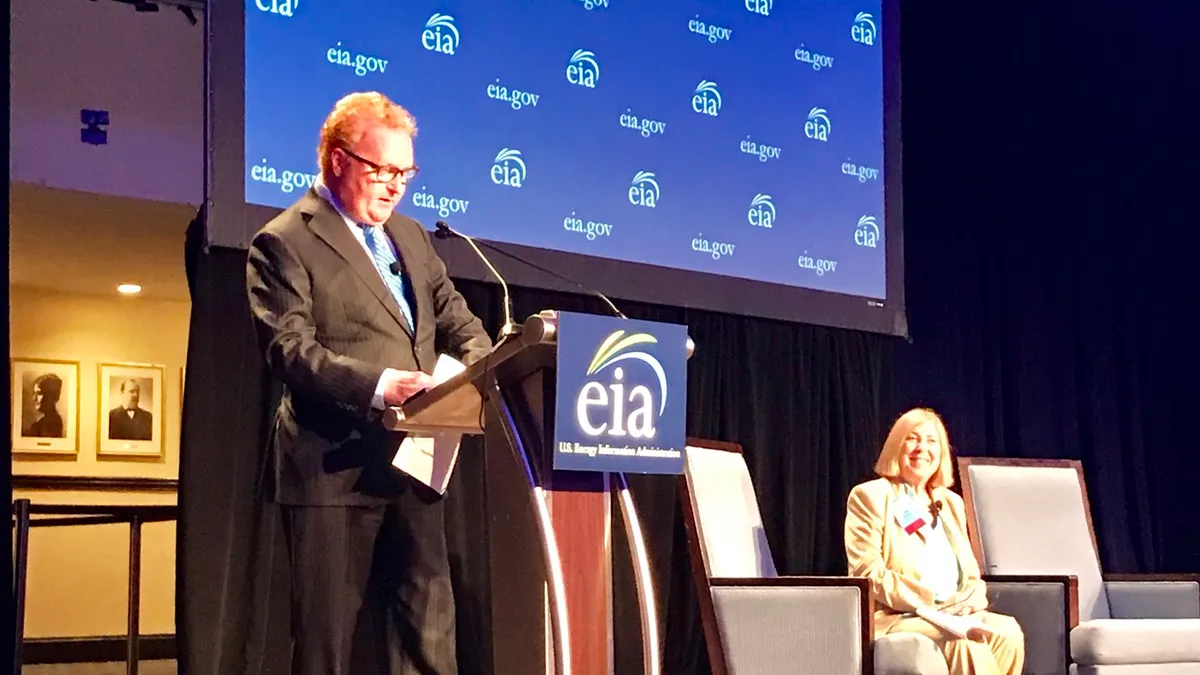Dive Brief:
- Following Tuesday's keynote address at an Energy Information Administration conference, Federal Energy Regulatory Commission (FERC) Chairman Kevin McIntyre said he trusts Energy Secretary Rick Perry to make a decision about invoking emergency powers to save coal and nuclear plants from retirement.
- Those cases would begin essentially as settlements that could be brought before FERC, but McIntyre posited that the commission could be kept out of the process. In that case, those settlements between the federal government and the owners of the coal and nuclear plants wouldn't have to meet FERC's "just and reasonable" standards for wholesale energy rates and would instead be subject to "effectively an easier standard," he told reporters.
- According to a draft Energy Department memo released last week, the Trump administration plans to direct the federal government to purchase electricity or generation capacity from plants for two years. But the details of DOE's bailout package for at-risk generators remain unclear and DOE Undersecretary Mark Menezes told reporters that the draft was being considered as an option.
Dive Insight:
The details of FERC's potential role in federal support for coal and nuclear plants show that the agency will not likely have the discretion to block any proposed subsidies.
The DOE is considering its options to preserve baseload power as the country faces an increasing amount of coal and nuclear power plant retirements. In a Friday statement, President Donald Trump called for Sec. Perry to "prepare immediate steps" to prevent the plants from retiring. One possible plan to achieve that, outlined in the draft memo, would have Sec. Perry invoke the agency's emergency powers under Section 202(c) of the Federal Power Act and the 1950s law that allows the agency to nationalize parts of the power sector during wartime — the Defense Production Act (DPA).
McIntyre remarked that DPA language starts referencing wartime situations but it also covers other types of emergencies that "could be invoked to capture this situation."
Under 202(c), the DOE can order that certain generators be able to recover their costs from ratepayers in the case of a grid emergency, while the DPA provides the agency wider control over power production and fuels when the president declares a national security risk.
While FERC unanimously rejected a DOE subsidy proposal in January, determining that no grid emergency exists to justify implementing 202(c) or the DPA, McIntyre said the 202(c) subsidies could be done without FERC involvement.
"Under the law as it’s written and the regulations of the DOE, I think that there are different scenarios that could develop that would not involve a rate proceeding before the FERC," McIntyre said.
However, FERC could treat unresolved settlements as rate proceeding cases, which "in a sense it would almost be bread-and-butter." Those cases would be subject to the commission's "just and reasonable standards."
McIntyre further told reporters it was not FERC's duty to establish the need to invoke 202(c) and that if Sec. Perry would invoke that "rarely" used authority, "it would be completely valid."
"If the trigger is pulled, so to speak, on Section 202(c), then in the first instance the law contemplates that the entity to be compensated under the directive is to work out or attempt to work out arrangements in a contract-type format with the entity that would be providing the compensation," McIntyre said. Essentially, this would be done in a "settlement fashion" between the DOE and select power plants. "If that effort should fail, then the matter could well come to the FERC," he added.
McIntyre said he had not seen a list of plants that may be involved.
Meanwhile, former FERC Chairman Jon Wellinghoff, and other analysts, have said subsidizing that many plants could depress prices in the rest of the market, driving other generators out of business or forcing them to pursue financial support of their own.
Analysis of the recently announced planned deactivations of certain nuclear plants from PJM Interconnection, the nation's largest electricity market, showed "no immediate threat to system reliability." Many retiring coal and nuclear plants are sited within PJM, but the grid operator said in a statement on Friday that drastic action from the administration was not necessary.
When questioned about PJM's statement, Menezes said the DOE is considering options to strengthen resilience, not just reliability. The plan concerns "more than the markets," he told reporters at the EIA conference, as "the markets don’t exist everywhere in the country."















